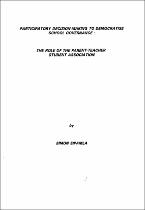| dc.contributor.advisor | Kruss, G | |
| dc.contributor.author | Sipamla, S | |
| dc.date.accessioned | 2023-06-13T20:20:14Z | |
| dc.date.available | 2023-06-13T20:20:14Z | |
| dc.date.issued | 1995 | |
| dc.identifier.uri | http://hdl.handle.net/11394/10231 | |
| dc.description | Magister Educationis - MEd | en_US |
| dc.description.abstract | This mini-thesis is an attempt to investigate how the Parent-
Teacher-Student Association of one high school goes about its aim of democratising school governance. It attempts to identify the influences and constraints which affect the way in which the
Parent-Teacher-Student Association as a governing body is conducted in practice.
The general problem in the Parent-Teacher-Student Association is the capacity to participate effectively in decision-making in order to democratize school governance. Central to the problem of
the Parent-Teacher-Student Association is the concept of power relations among the three constituent groupings that form this governing body. One high school was visited to gather data. Data eras gathered through a case study method using a technique of non-participant observation, an analysis of documents and minutes of the Parent-Teacher-Student Association's meetings and interviews.
The historical development of Parent-Teacher-Student Association was investigated. The problems and possibilities in the functioning of each sector of the Parent-Teacher-Student Association were also highlighted.
The other findings are that power has influence in decision-making. The 'lay' professional relationship becomes dictated in terms of the professionals. The relationship between the headmaster and the PTSA is important for the smooth running of the school. Generational domination was evident between the parent and student sectors of the Parent-Teacher-Student
Association. The forging of a partnership between the school and community was found to be problematic, given the perceived uneven distribution of power in the Parent-Teacher-Student Association.
The mini-thesis concluded that there are problems in the functioning of the Parent-Teacher-Student Association. The problems are caused by the following factors: methods of election, mistrust among members, uneven distribution of power, the representative nature of the PTSA components, one-year term of office, inconsistency of the membership, not a paid job, legislation of PTSAs, questioned role of the student sector, generational and educational gap and no capacity building programmes.
There is scope for developing the partnership between the school and community Ln school governance. | en_US |
| dc.language.iso | en | en_US |
| dc.publisher | University of the Western Cape | en_US |
| dc.subject | Democratize school governance | en_US |
| dc.subject | Decision making | en_US |
| dc.subject | Parent- teacher- student association | en_US |
| dc.title | Participatory decision-making to democratize school, Governance: the role of the parent-teacher-student association | en_US |
| dc.rights.holder | University of the Western Cape | en_US |

